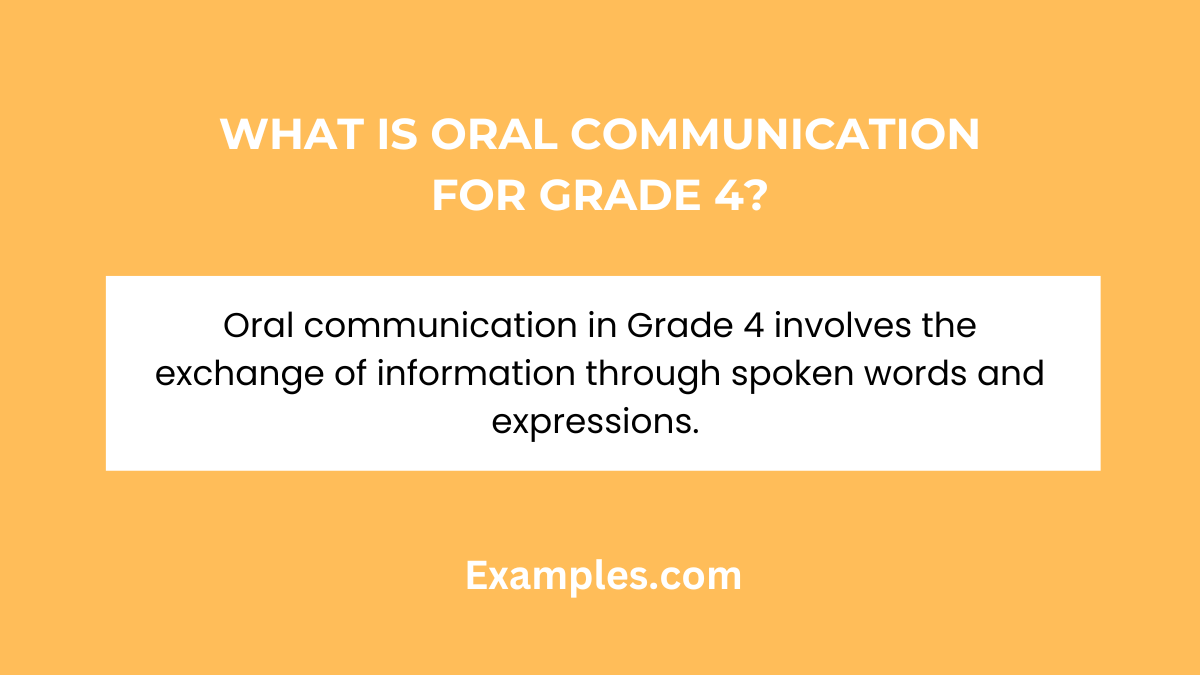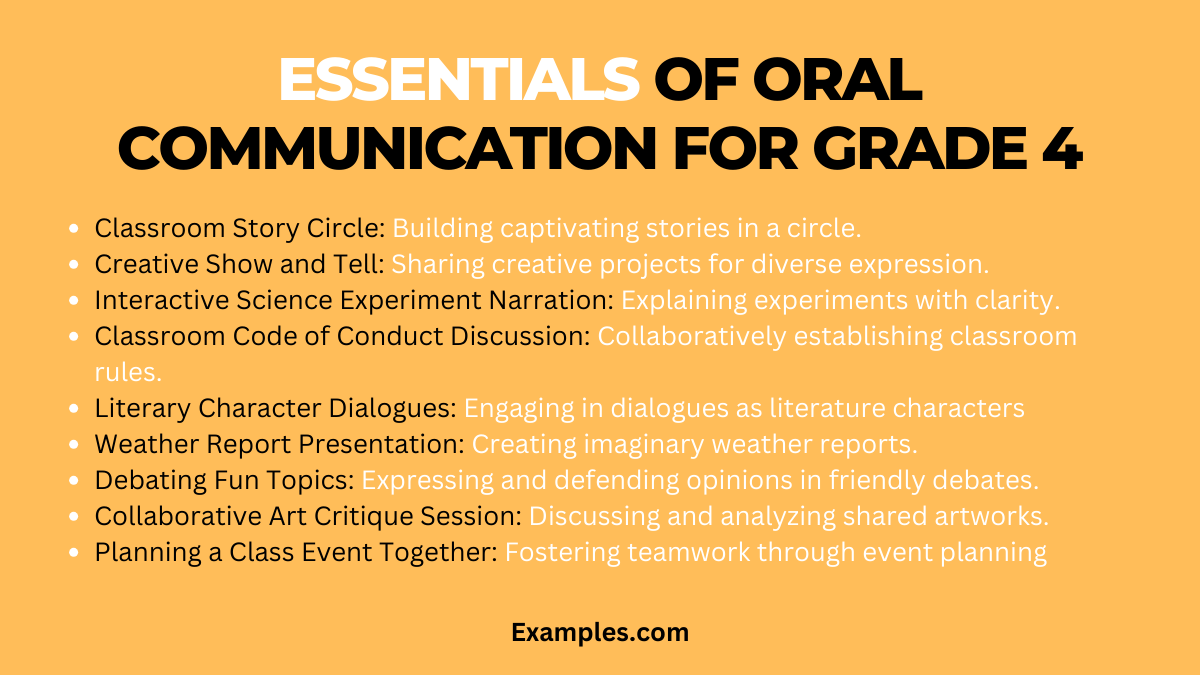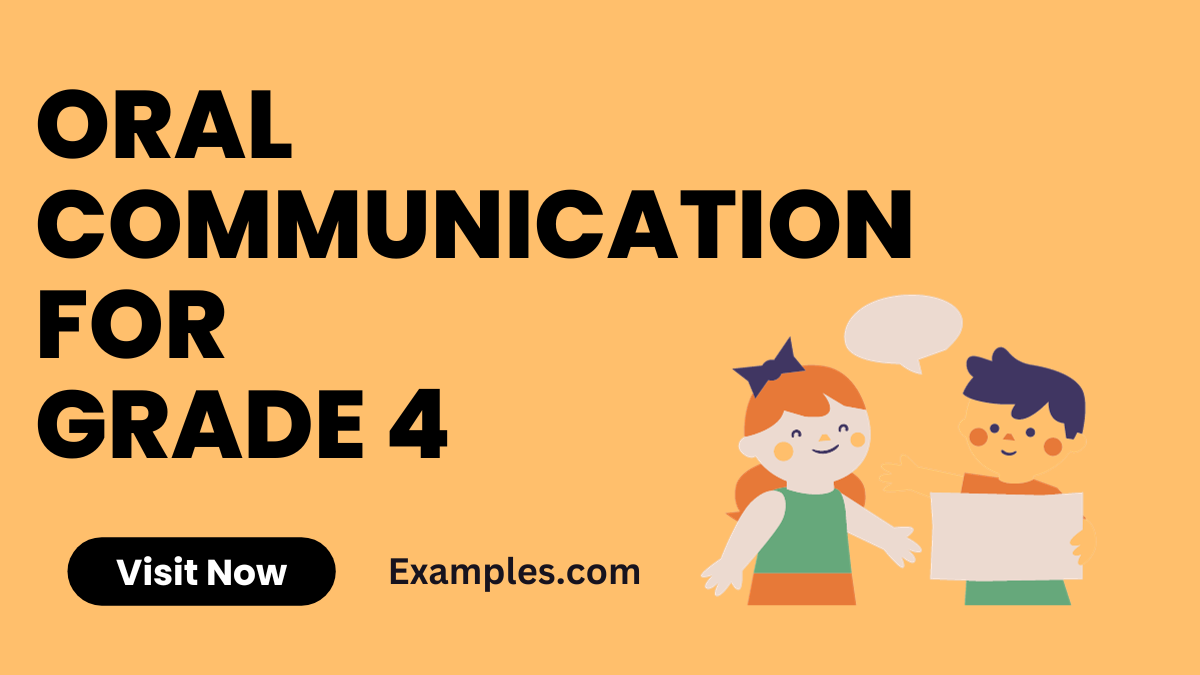29+ Oral Communication for Grade 4 Examples
Unlock the full potential of oral communication for Grade 4 with our comprehensive guide. This article delves into essential communication skills, activities, and strategies tailored for fourth-grade learners. Explore a rich array of communication examples, providing practical insights to enhance verbal and nonverbal interactions. Elevate your child’s communication abilities with engaging tips and activities, fostering effective communication both in and out of the classroom. Dive into this enriching guide for a vibrant exploration of oral communication in Grade 4
What is Oral Communication for Grade 4?

Oral communication for Grade 4 refers to the exchange of information through spoken words and expressions among fourth-grade students. In simple terms, it encompasses verbal interactions, discussions, and presentations within the context of the fourth-grade learning environment. This essential skill involves both speaking and listening, fostering effective communication that aids in academic growth and social development. Understanding oral communication for Grade 4 lays the foundation for improved interpersonal skills and successful engagement in various educational activities.
What is the best Example of Oral Communication for Grade 4?
One outstanding example of oral communication for Grade 4 involves structured class discussions. In this scenario, students actively participate in conversations, expressing their thoughts, asking questions, and responding to peers. This fosters a dynamic learning environment, promoting not only verbal articulation but also attentive listening. Through such interactions, students develop crucial communication skills, including clarity, active engagement, and respectful dialogue. This example exemplifies the effective integration of oral communication in Grade 4, enhancing both academic and social aspects of learning.
30 Oral Communication for Grade 4 Examples:
Unlock a treasure trove of 30 engaging examples tailored for Grade 4 oral communication. From lively classroom discussions to interactive activities, these examples nurture essential skills in young learners.
- Expressive Storytelling: Encourage students to share their imaginative tales, honing verbal fluency.
- Group Problem-Solving: Foster collaboration through discussing and solving challenges together.
- Show and Tell Sessions: Develop confidence by presenting personal objects and ideas to classmates
- Role-Playing Scenarios: Introduce various situations for students to act out, enhancing communication adaptability.
- Debates on Fun Topics: Promote critical thinking as students express and defend their opinions in a friendly debate.
- Interactive Reading Sessions: Encourage reading aloud, fostering clear articulation and comprehension skills.
- Interviewing Classmates: Develop interpersonal skills by conducting interviews within the classroom.
- Creating and Presenting a Weather Report: Combine creativity with communication as students report on imaginary weather conditions.
- Sharing Personal Achievements: Bolster self-expression by discussing personal accomplishments and goals.
- Asking Open-Ended Questions: Cultivate curiosity and communication by encouraging thoughtful inquiries.
- Planning a Class Event: Enhance teamwork and communication through organizing a collaborative class event.
- Describing a Favorite Book: Hone descriptive language skills as students discuss their favorite literary works.
- Constructing a Collaborative Story: Foster teamwork by collectively building a creative narrative.
- Conducting a Science Experiment Recap: Reinforce understanding by summarizing and explaining conducted experiments.
- Creating a Class Newsletter: Develop communication through collaborative writing and information sharing.
- Sharing Cultural Traditions: Cultivate diversity awareness by discussing and presenting cultural practices.
- Expressing Gratitude: Foster a positive atmosphere by encouraging students to express gratitude towards their peers.
- Presenting a Historical Figure Report: Combine research skills with communication as students present findings on historical figures.
- Discussing Healthy Habits: Promote well-being by engaging in conversations about healthy lifestyle choices.
- Reviewing a Shared Book: Enhance comprehension through group discussions on a shared reading material.
- Performing a Short Play: Encourage creativity and teamwork through small theatrical performances.
- Sharing Vacation Experiences: Develop narrative skills as students recount and share their vacation adventures.
- Creating and Solving Math Word Problems: Integrate mathematics with communication by crafting and solving word problems.
- Explaining a Science Concept: Strengthen understanding through clear explanations of scientific principles.
- Collaborative Art Critique: Foster constructive criticism and appreciation through analyzing shared artworks.
- Planning and Presenting a Class Survey: Develop data interpretation and communication skills through conducting surveys.
- Deconstructing a News Article: Enhance critical thinking by discussing and analyzing current events.
- Comparing and Contrasting Ideas: Develop analytical skills through discussions comparing different concepts or perspectives.
- Celebrating Personal Achievements: Create a supportive environment by sharing and applauding individual successes.
- Discussing Future Aspirations: Encourage forward-thinking as students articulate their future goals and ambitions.
Oral Communication for Grade 4 Examples in Class
Transform the classroom into a vibrant hub of communication with these Grade 4 examples. Focused on in-class interactions, these activities enhance verbal fluency, teamwork, and creative expression. Encourage students to share ideas, ask questions, and actively participate in a variety of engaging scenarios, fostering a positive and communicative learning environment.
- Classroom Story Circle: Form a circle, and each student contributes a sentence to collectively build a captivating story.
- Interactive Math Problem Solving: Collaborate on solving math problems aloud, promoting mathematical communication skills.
- Role-Reversal Discussions: Students take turns leading discussions, encouraging diverse perspectives and leadership.
- Science Experiment Narration: Explain conducted experiments to classmates, emphasizing clarity and understanding.
- Classroom News Reporting: Assign roles for students to report on classroom news, encouraging clear and concise communication.
- Creative Show and Tell: Beyond personal objects, students share creative projects or achievements to foster diverse expression.
- Collaborative Art Critique Session: Discuss and analyze shared artworks, promoting constructive criticism and appreciation.
- Oral History Presentations: Research and present findings on historical events or figures, enhancing informative communication.
- Literary Character Dialogues: Engage in dialogues as characters from literature, fostering creativity and language skills.
- Classroom Code of Conduct Discussion: Collaboratively establish and discuss classroom rules, promoting a sense of responsibility and communication.
Oral Communication Activities for Grade 4

Elevate Grade 4 learning with a plethora of engaging oral communication activities. From lively debates to creative storytelling, these activities are designed to enhance communication skills, confidence, and interpersonal interactions. Explore a diverse range of activities that encourage students to actively participate, express their thoughts, and develop a strong foundation in effective oral communication.
- Debating Fun Topics: Encourage critical thinking as students express and defend opinions in a friendly debate setting.
- Weather Report Presentation: Students create and present imaginary weather reports, combining creativity with communication.
- Group Problem-Solving Challenges: Foster collaboration by discussing and solving challenges together in a team setting.
- Interactive Reading Sessions: Develop clear articulation and comprehension skills through reading aloud and group discussions.
- Class Interview Sessions: Enhance interpersonal skills by conducting interviews with classmates in a structured setting.
- Planning a Class Event Together: Foster teamwork and communication skills through collaborative event planning.
- Describing Favorite Books: Hone descriptive language skills as students discuss and present their favorite literary works.
- Asking Open-Ended Questions: Cultivate curiosity and communication by encouraging thoughtful inquiries within the class.
- Presenting a Historical Figure Report: Combine research and communication skills as students present findings on historical figures.
- Constructing a Collaborative Story: Develop teamwork by collectively building a creative narrative, encouraging creativity and cooperation.
What are Oral Communication Skills for 3rd Grade?
Oral communication skills play a pivotal role in a child’s academic and social development. In the context of 3rd grade, these skills lay the foundation for effective expression and comprehension. This comprehensive guide explores the key aspects of oral communication skills tailored for 3rd-grade learners.
- Expressive Storytelling: Encourage students to share imaginative tales, honing verbal fluency and narrative skills.
- Interactive Reading Sessions: Promote clear articulation and comprehension through reading aloud and group discussions.
- Role-Playing Scenarios: Introduce various situations for students to act out, enhancing communication adaptability.
- Group Problem-Solving: Foster collaboration by discussing and solving challenges together in a team setting.
- Class Interview Sessions: Enhance interpersonal skills by conducting interviews with classmates in a structured setting.
- Asking Open-Ended Questions: Cultivate curiosity and communication by encouraging thoughtful inquiries within the class.
- Show and Tell Sessions: Develop confidence by presenting personal objects and ideas to classmates.
- Interactive Math Problem Solving: Build mathematical communication skills by collaboratively solving problems aloud.
- Debates on Fun Topics: Encourage critical thinking as students express and defend opinions in a friendly debate setting.
What are the Essentials of Oral Communication for Grade 4?

Grade 4 marks a crucial stage in a student’s education, where oral communication skills become increasingly vital. This guide delves into the essentials of oral communication, offering insights into activities and strategies tailored for 4th-grade learners.
- Classroom Story Circle: Form a circle for students to collectively build a captivating story, enhancing communication skills.
- Creative Show and Tell: Beyond personal objects, encourage students to share creative projects, fostering diverse expression.
- Interactive Science Experiment Narration: Explain conducted experiments to classmates, emphasizing clarity and understanding.
- Classroom Code of Conduct Discussion: Collaboratively establish and discuss classroom rules, promoting responsibility and communication.
- Literary Character Dialogues: Engage in dialogues as characters from literature, fostering creativity and language skills.
- Weather Report Presentation: Students create and present imaginary weather reports, combining creativity with communication.
- Debating Fun Topics: Encourage critical thinking as students express and defend opinions in a friendly debate setting.
- Collaborative Art Critique Session: Discuss and analyze shared artworks, promoting constructive criticism and appreciation.
- Planning a Class Event Together: Foster teamwork and communication skills through collaborative event planning.
In conclusion, mastering oral communication skills at an early age lays a solid foundation for academic success and personal development. The insights provided in this guide for Oral Communication for Grade 4 offer valuable tools for educators, parents, and students alike. By actively participating in class discussions, honing presentation finesse, and navigating various communication scenarios, young learners can build confidence and articulate thoughts effectively.
For further resources on fostering oral language skills in children, the North Carolina Department of Public Instruction provides a comprehensive guide tailored for 4th and 5th graders. Additionally, parents can explore practical tips and insights on children’s communication development at KidsHealth. These external links to reputable educational and health resources aim to enrich the reader’s understanding and provide actionable strategies for nurturing oral communication skills in young learners.



